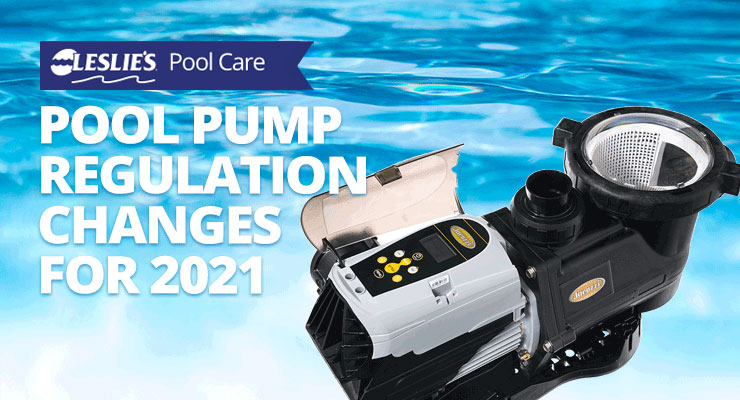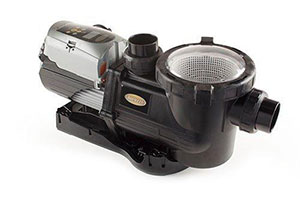
Pool Pump Regulation Changes for 2021
Effective July 19, 2021, there are new pool pump regulations put in place by the Department of Energy (DOE). To help you understand these changes, we've put together a detailed guide explaining the new regulations and how they might affect pool owners.
The new regulations state that any pool pump manufactured after July 19, 2021, must comply with updated guidelines aimed at energy efficiency standards, which vary based on the type and size of the pool pump. Larger single speed pumps for inground pools and other applications will soon be replaced by variable speed pool pumps. Only a handful of smaller single speed pumps will still meet the mandated regulations. Unlike previous state legislation, which only spelled out the requirements for pool filtration pumps, the new DOE regulations apply to all pumps, regardless of application. These requirements focus on meeting the minimum efficiency standards for U.S. homes and businesses.
The new pool pump regulations resulted from a number of sources, including utility companies, manufacturers, trade associations, and consumer groups to create new standards that would be fair and feasible. The Office of Energy Efficiency and Renewable Energy produced a document in Sept. 2018 entitled “Energy Conservation Standards for Dedicated-Purpose Pool Pump Motors."
So what does all this mean for you?
Do I Have to Buy a New Pool Pump?
Not necessarily. If your current pump fails, you'll be given the option to upgrade to a more efficient unit. For example, you might want to purchase a variable speed pool pump. However, if you want to replace your pump with another large single speed model, you'll still be able to do so. That is, as long as you can find one. After the July 19 cut-off date, manufacturers will no longer be able to produce pumps that don't meet the efficiency requirements. That doesn't mean retailers can't sell them. However, leftover inventory of non-compliant single speed pumps is expected to deplete quickly. So, it will be more difficult to find less efficient single speed pool pumps after the regulations go into effect.
What is Hydraulic Horsepower and How Does it Factor?
Hydraulic Horsepower is the true measure of a pump's performance. It represents the amount of water a pump can push to, and through, the pool. The new regulations for 2021 are such that any single speed pumps operating at 0.711 HHP or higher (up to approximately 2.5 HHP) do not meet the regulations, and should be replaced with variable speed technology. However, there are still minimum efficiency requirements for pumps less than 0.711 HHP, and not all single speed pumps meet those requirements.
ENERGY SAVINGS TIP: Although you don't have to change your existing pump, and even if your current single speed pump operates at less than 0.711 HHP, switching to a variable speed pump can save you significant money on your utilities bill each month. See how much you can save with our energy calculator.
Are There Exemptions or Exceptions?
Yes, there are some exceptions. As of now, the DOE is primarily concerned with pumps used on inground pools. There are no minimum efficiency requirements for:
- Pool pumps with greater than approximately 2.5 HHP.
- Waterfall pumps, manufactured and labeled as a waterfall pump.
- Integral sand and cartridge pump and filter units used on portable pools.
- Rigid spa filter pumps and circulation pumps.
Pressure cleaner booster pumps are included in the new DOE regulations and must meet minimum efficiency requirements. That said, most single speed pressure cleaner booster pumps will be compliant with the efficiency standards. In addition, many non-self-priming pumps used for above ground pools will fall within the minimum efficiency standards for single speed pumps. These will still be eligible for manufacture.

What Are the Benefits of a Variable Speed Pool Pump?
The biggest advantage is that a variable speed pool pump can save 40-80% on your utilities bill by consuming less energy. That range depends on how you use your pump and how much resistance is in your filter system. Running a variable speed pool pump on low speeds a majority of the time saves the most money, with higher speeds used only for filtering, cleaning, or heating purposes.
System resistance is also key. Two-inch plumbing, with simple designs (limited 90° elbows), has less resistance to overcome and thus uses less energy. Large cartridge filters are ideal because they have no backwash valve; slide valves have significantly less resistance than multiport valves.
BONUS TIP: In addition to energy savings, variable speed pool pumps are often quieter and cooler to the touch. They generally last longer than standard single speed pump motors.
How Are Variable Speed Pumps Installed?
Variable speed pool pumps are installed just like any other pump. Larger variable speed pumps are often wired with 230V, but certain other VS pumps (including the new Jacuzzi JVS pumps) can accept either 115V or 230V power. Plumbing is exactly the same — one pipe in, one pipe out, attached with a thread sealant (such as Teflon tape).
Can Above Ground Pools Use Variable Speed Pool Pumps?
Yes. Just like with an inground pool, check to make sure that the pump's flow rates are fairly close to the filter's flow rate, and do not exceed it on high speed by more than 10-20%.
See how you can get ahead of the upcoming requirements, and take a look at our Variable Speed Pool Pump selection to find which one is right for you and your pool. For questions about the upcoming regulation changes, variable speed pool pump selection, or pump installation, contact or stop by your local Leslie's store.